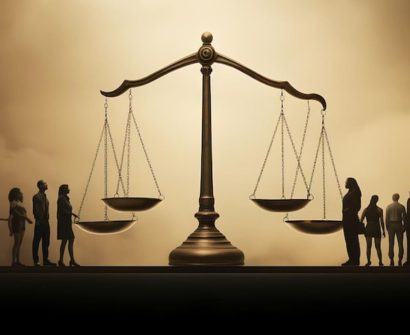
As an essential component of governance in democracies, the court system is charged with safeguarding the rule of law and securing justice for all. The notion of judicial accountability, which aims at maintaining the legal system’s honesty, transparency, and confidence among the public, serves as vital to its functioning. But similarly to every other organization, the judiciary experiences problems and conflicts. Therefore, it is crucial that we establish strong accountability processes with the goal of protecting the fundamental tenets of justice and fairness.
Judicial Accountability
- As per the judicial accountability meaning, it states that judges are responsible for the decisions they make. It also implies that justices must accept accountability for their acts.
- The judicial branch of government is not held to the same standards of accountability as the executive or legislative branches.
- Judges alone are accountable for their decisions. Transparency in the decision-making process ensures accountability. All public officials have an obligation to answer to the public for the choices they make and the work they do.
- The responsibilities and tasks fulfilled by the public entity determine the degree of accountability. In a similar vein, accountability also extends to the government’s judiciary branch.
- Nonetheless, the judicial arm of the government is not subject to the same accountability requirements as the legislative or executive branches.
judicial accountability examples
- One example of Judicial Accountability in India is the 2011 Calcutta High Court impeachment case against Justice Soumitra Sen. A move for his expulsion was passed by the Rajya Sabha after he was charged with financial malfeasance.
- This case highlights the judiciary’s accountability through the constitutional indictment procedure, demonstrating the commitment to upholding judicial integrity and transparency.
judicial accountability in india: Requirements
- Constitution’s Guardian: Since the court is tasked with upholding our constitution, Judicial Accountability is particularly important. As such, it is far more detrimental for values to be transgressed there than in any other body of government.
- Public Confidence: In order to preserve its institutional independence, the judiciary must endeavour to preserve the public’s faith in the established courts.
- Quick Justice: In addition to being an essential human right, prompt justice is also necessary for maintaining the rule of law and running an efficient government.
- No Legal Obligation: Unlike the government, the judiciary is not compelled by law to produce annual reports or submit them to Parliament or the State Legislature.
- Impartial Functioning: It will help to guarantee an impartial operation that will boost the public’s trust in the legal system as a whole.
- Limited Scope of Right to Information: Courts are willing to release a limited amount of data under RTI.
judicial accountability: Obstacles in Keeping the Judiciary Accountable
- In the case of Veeraswamy, it established the additional immunity that judges enjoy. It stated that judges of the Supreme Court or High Court cannot be the subject of an investigation into any criminal offense involving corruption, nor can a formal complaint be filed against them without the Chief Justice’s consent. Once more, it is unlikely that the CJI will grant such authority because it could disgrace the judiciary as a whole.
- The absence of a majority vote from the Houses of Parliament resulted in a disastrous outcome for the apex court’s impeachment attempt in the Ramaswamy case. Despite being accused of squandering court funds, Justice Ramaswamy was not removed from office due to a party’s failure to cast a vote.
judicial accountability and judicial independence
- The symbiotic relationship between judicial independence and accountability is necessary to guarantee that the true goal of the judiciary’s establishment is fulfilled.
- The process of accountability facilitates transparency. When one is answerable to the law, it is most easily attained.
- Judiciary independence and accountability are therefore the two most crucial factors that can help to lessen conflict between the legislative and judicial branches of government since they promote judicial autocracy and enable the government to function more smoothly.
Important duties have been assigned to the judiciary to perform. Fairness and transparency are the two essential components that judges, who serve as the courts’ representatives, must embrace. The judiciary should have a more robust and advanced system of accountability to offer clarity to the decision-making process and bolster public confidence in the legal system. Numerous accusations have been made against numerous Chief Justices, judges of the Supreme Court, and High Courts over their alleged partiality in case decision-making.
Judicial Accountability FAQs
- How do you ensure accountability of the judiciary?
Article 235 of the Indian Constitution defines accountability as a necessary component of judicial independence. In order to ensure the lower courts’ accountability, this article grants the High Court the power to exercise control over them.
- What are the problems of judicial accountability in India?
The Code of Conduct cannot be enforced with sufficient means or equipment. The Supreme Court judges are appointed and removed in accordance with Article 124. In the same vein, Article 217 addresses the nomination and removal of High Court judges.
- What are the advantages of judicial accountability?
- By discouraging actions that would jeopardize the independence, integrity, and impartiality of judges, it advances the rule of law.
- It fosters public trust in the courts and judges.
- What are the provisions of judicial accountability?
Article 124 of the Indian Constitution allows judges of the Supreme Court of India and High Courts to be removed from office for misbehaviour or incapacity through the process of impeachment.
- What is the concept of judicial accountability?
According to the theory of judicial accountability, justices are accountable for the choices they make. It also implies that justices must accept accountability for their deeds. The judicial branch of government is not held to the same standards of accountability as the executive or legislative branches.
- What are the problems in accountability and judicial law making?
The process of choosing judges, the method for dismissing judges, the threat of contempt of court, etc. The Indian government has implemented certain measures aimed at enhancing the accountability of judges. However, the situation remains unchanged.
- Is justice accountability?
To put it simply, accountability is the result of the choices or acts we do. Individual accountability is the purest type of accountability, even though organizations and groups can also be held accountable.
- What is the main importance of judiciary?
The judiciary’s primary responsibility is to uphold the supremacy of the law and defend the rule of law. Individual rights are protected, conflicts are resolved in line with the law, and democracy is prevented from giving way to tyranny on an individual or collective level.
- Which Online rjs coaching is best for RJS preparation?
The reputable Jaipur Online rjs coaching program “Jyoti Judiciary Coaching” aids students in getting ready for the RJS exam. A systematic approach to RJS test preparation is made possible by Jyoti Judiciary, the top offline and online RJS coaching program in Jaipur. Their curriculum has been carefully designed to cover all the subjects and courses required for passing the Rajasthan Judicial Service Examinations.
- Which coaching is best for judiciary?
The most effective judiciary coaching in Jaipur is provided by Jyoti Judiciary Coaching. The objective is to create a comfortable learning environment for the students. It makes the difficult task seem easy, which increases the likelihood of achieving the desired outcome. The objective at Jyoti Judiciary is to give students the best possible education possible. The Institute pledges to use every resource at its disposal to provide you with the finest preparation for the Judicial Services entrance examinations.
With the goal of giving students the best coaching available for law entrance exams including the CLAT, AILET, and various other numerous state judiciary exams, Jyoti Judiciary Coaching, India’s Finest educational Platform, was established. Come enrol now with Jyoti Judiciary!
For any latest news, legal topics, judiciary exams notifications, patterns, etc watch Jyoti Judiciary’s YouTube channel for legal videos for any updates at https://youtube.com/@jyotijudiciarycoaching4852?si=2cwubh9d2A9urwJf










